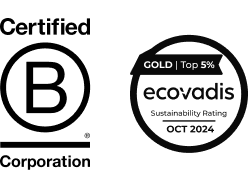Trends, learnings and inspiration from one of Europe’s top innovation conferences
© Jason Andrew for DLD
Artificial intelligence. Blockchain. Quantum computing. Virtual reality. Augmented reality. Autonomous driving. It’s clear. Digital transformation is rapidly changing the world of work.
But what will the Fourth Industrial Revolution look like?
Named “one of the two most important innovation conferences in Europe” by The Economist, DLD – which stands for Digital. Life. Design. – started in 2005 as an intimate gathering of friends interested in how digital transformation will shape the future. Today, it brings together some of the world’s top thinkers, innovators, disruptors and politicians to explore and present trends, research and predictions on “how the digital age fundamentally changes our lives, society and business.”

This year’s event focused on the theme “Optimism & Courage.” Over 150 speakers – including Facebook COO Sheryl Sandberg, BMW CEO Harald Krüger, Germany’s Federal Minister for Economic Affairs and Energy Peter Altmaier, Amazon CTO Werner Vogels and NYU Professor Scott Galloway – covered topics ranging from artificial intelligence, renewable energy and autonomous driving to the business value of trust, block chain and cognitive diversity.
Here are six main takeaways – and how they affect the future of work – from Steelcase attendees:
1. HUMANS & MACHINES, WORKING TOGETHER
“Accenture’s Chief Technology & Innovation Officer Paul Daugherty discussed his book – “Human + Machine: Reimagining Work in the Age of AI” – which talks about the future of computer and human collaboration. It shows how jobs and tasks can be retouched and redesigned, so that humans and machines can augment each other’s work. I’d recommend for everyone to read it to build that knowledge on this topic and to see the very positive implications for the workplace of the (near) future.”
— Gale Moutrey, Global VP, Brand & Workplace Innovation

2. SOCIAL INNOVATION – USING TECH FOR GOOD
“I was particularly inspired by Fatoumata Ba, an incredible entrepreneur who’s found ingenious ways to apply technology for good in Africa. First at Jumia, Africa’s first tech unicorn, and now at her non-profit social startup studio Janngo, Ba leverages her entrepreneurial talents to unleash those of others. At Jumia specifically, she tailored the existing business model to the local market, helping SMEs leapfrog over the hurdles of developing nations to generate incredible growth, while still having a positive social impact. For example, her team expanded their customer reach by providing 45,000 otherwise unemployed people with tablets loaded with digital catalogues to sell products on Jumia’s platform in their communities, creating incredible reach. Not only was the income itself important, but it was also the sense of pride and dignity these sellers felt in generating significant revenue for their households. Given the size of unmet demand and opportunity in Africa, she launched a simple challenge to the audience: ‘what are you waiting for?’”
— Beatriz Arantes, Manager, WorkSpace Futures
3. THE IMPORTANCE OF COGNITIVE DIVERSITY & CONTINUOUS LEARNING
“The DLD conference is all about being a learning community. We certainly don’t know it all, but we should – and will – continue to learn it all. Founder and CEO of Ingenuity Amy Wilkinson talked about how integrating and harnessing cognitive diversity is one of the most important skills for leaders and entrepreneurs. The more we learn from and about each other, the more successful our ideas and businesses will be.”
— Stephan Derr, VP, Sales

4. THE CURRENCY OF TRUST
“Our world is at a peak of complexity and change. Innovation needs creativity. Creativity needs flexibility. And flexibility needs trust. Author and trust expert Rachel Botsman spoke about the essential need for trust and its role as a ‘currency of interactions.’ We need to be competent, reliable, empathic and have integrity to be trustworthy, Botsman says. I believe this equally relates to individuals and businesses. And as emerging technologies and different generations (with different expectations) revolutionise work, the workplace of the future needs trust as a basis.”
— Isabel Ebner, Account Manager

5. ARTIFICIAL INTELLIGENCE AS AN OPTIMISATION TOOL
“We spent three outstanding days full of inspiration, ideas and connecting tomorrow’s unknowns. The world’s AI movers and shakers took stage, including venture capitalist and AI expert Kai-Fu Lee. He stressed that AI serves as an optimisation tool; ensuring that strategic and creative jobs will remain to be important. He called on all of us to connect with each other and build trust. Love and compassion, he said, are what hold us together – especially as technology’s role becomes bigger. The question is: how will AI help us humanise the workplace?”
— Monika Steilen, Director, Communications
6. LESSONS FROM THE FASHION WORLD
“The fashion world is on vogue: constantly changing and fast-paced. Streetwear and social responsibility are on the rise. Young designers, like Samuel Ross, are seeing themselves more as interdisciplinary creatives that drive social change. They’re working in a more holistic way, taking inspiration and involving aspects of their everyday life – much like the Bauhaus movement. We could learn so much from this industry!”
— Pascal Hien, Industrial Designer





.png)



